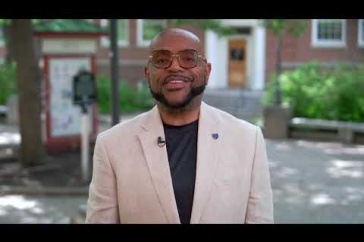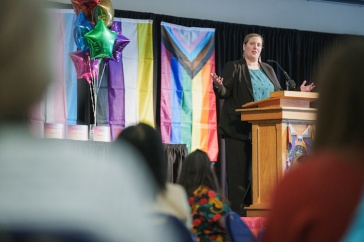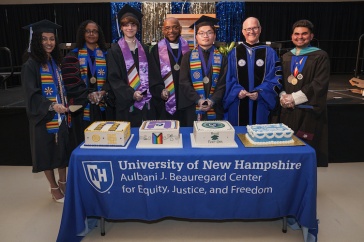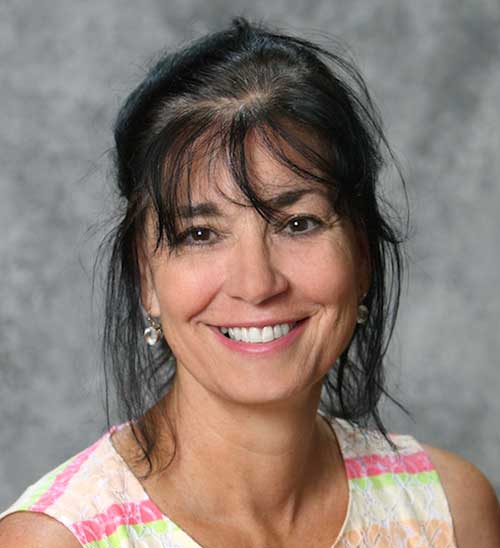
Jaime Nolan likes good conversation. In her role as associate vice president for community, equity and diversity, she converses a lot, and with many different people. And, like any good conversationalist, she’s also a keen listener. Listening is what Nolan has been doing a lot of in recent months. This past fall, she and the UNH Task Force on Community spearheaded a series of conversations on all three UNH campuses with the aim of finding out how UNH can foster a learning community that is safe, inclusive and equitable for all.
The series, dubbed Conversations at the Crossroads, drew more than 200 community members — faculty, staff and students — who took part in facilitated small-group discussions during which they shared what community means to them, what the ideal UNH community looks like and their ideas about how to make UNH campuses more inclusive places. A report released this week summarizes the conversations, and UNH Today sat down with Nolan to find out more and learn what comes next.
UNH Today: What’s the idea behind these conversations?
Nolan: UNH has a deep commitment to supporting an inclusive and diverse community — it’s one of the institutional values outlined in our strategic plan. When the results of an independent evaluation of Title IX efforts last spring revealed that UNH could be doing more to build a welcoming community, President Mark Huddleston called for the establishment of a task force made up of faculty, staff and students to examine what UNH understands “community” to mean. The idea was to identify steps the university could take to both walk the walk on our institutional values and comply with federal regulations. We kicked off a conversation series in November to engage dialogue on all three campuses.
UNH Today: You’ve just released the summary report. What happens next?
Nolan: We’re going to take what we’ve learned and create an action plan — a meaningful action plan that has lines of accountability. We’re moving into phase two for the task force, which will be charged with doing this through the spring and summer. The action plan will guide our execution of the important work to come. We’ll begin implementation in the fall.
UNH Today: According to the summary report, those who participated in the conversations expressed a need for “clarification and realization” of UNH values and priorities for inclusion and equity. What does this mean?
Nolan: What we heard from participants across all campuses was that there seems to be a disconnect between the things we say — our mission statements, diversity statements and so on — and what is reality, what we do. The community wants us to be more clear about what is aspirational in such statements, i.e., "This is what we hope to achieve," so our aspirations are not construed as what is reality at this time. We also need to be forthcoming and transparent about challenges and where we have fallen short.
UNH Today: The report highlights actions the university could take to forward its efforts in equity and inclusion. Is there any low-hanging fruit? Anything we can go after right away, even before the action plan is complete?
Nolan: Yes. One of the things that kept coming up in the conversations was the need for a process that people can follow if they see something of concern, whether a bias incident or something else, to be able to report it. And we do have that; it’s called Report It! While it works really well on the Manchester campus, elsewhere it’s perceived as not being fully functional. So we’re pulling together a group of people to reevaluate it, relaunch it and get it out there in a way that will be more meaningful and accessible to the community. That’s a relatively easy thing to do.
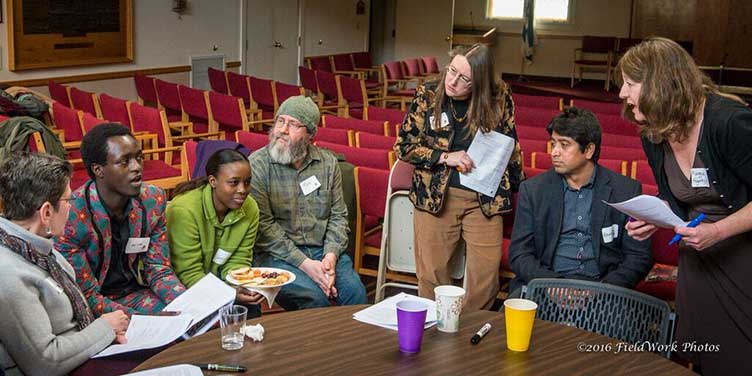
UNH Today: The report also reveals that community members feel a strong need for more “education and training opportunities for everyone on all three campuses” in the areas of equity and inclusion. Could you see UNH following through on this, and if so, what would this look like?
Nolan: I think we could definitely follow through on it, and there are a variety of ways to make this happen. We could offer seminars around such topics as "classrooms as inclusive communities" or "how to build an inclusive course" or "how to navigate difficult dialogue in the classroom." We could offer an enlightening speaker series or a shared reading. We already have a social justice educators program on campus, where training is offered to the UNH community. I think that if we continue to build on what we’ve started and explore what kinds of new educational opportunities can be developed, we can achieve this. Again, it’s important to acknowledge that there have been many similar initiatives in the past. It’s so important to the sustainability of these kinds of efforts that they are not person-dependent. They need to be institutionalized so as not to lose momentum and/or disappear.
UNH Today: Along the same lines, one of the suggestions highlighted in the report calls for making courses on social identity, diversity and social justice for-credit in order to motivate more students to enroll. Could that become a reality?
Nolan: That’s actually another piece of low-hanging fruit. There has been a lot of work, done well before I got here, to make these kinds of courses part of the discovery program.
UNH Today: These conversations occurred during a time of intense national discourse on similar issues — equity, inclusiveness, civility. How did that impact the process, if at all?
The Student Perspective
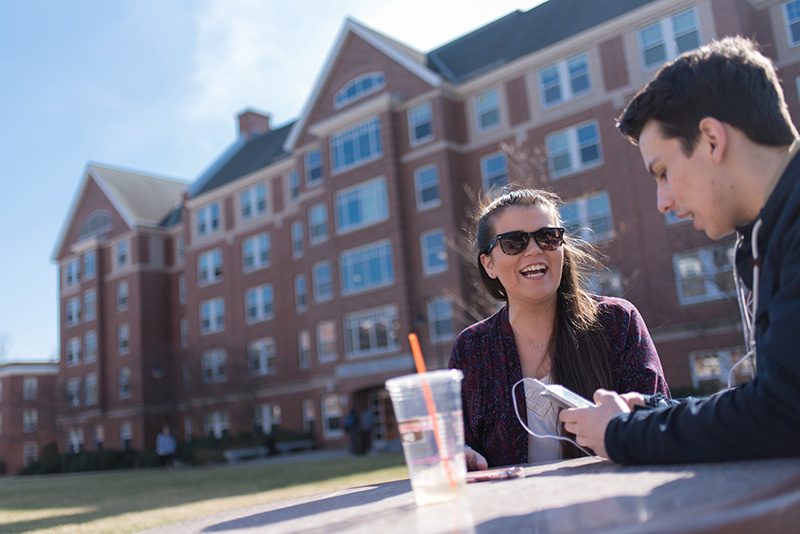
Many students were among the campus community members who took part in the community conversations last fall, lending critical perspective that will inform the forthcoming action plan. But what did they get out of it? We asked Nolan how conversations such as these help prepare UNH students for the world they will enter when they graduate. Here’s what she said:
When our students move out into the world, they will need to have the tools to be able to communicate across any chasm of difference, to be able to sit in their discomfort. Conversations like the ones they took part in last fall help them experience this. As an educator and a parent I feel a huge commitment to making this kind of education available to all of our students.
Nolan: I think we were — and still are — at a really interesting and critical point. With all that has gone on nationally — the Black Lives Matter movement, protests across the country about various issues including free speech and civility — how do we come together on all of that? There’s so much possibility when people come together across all of that difficulty. But that’s the challenge — getting people to be willing to muck around in uncomfortable conversations, to say, "Let’s put on our boots and roll up our sleeves; it’s going to be tough for a while, but it’s going to be great when we can move things to a better place." You can’t create a beautiful garden without doing some of that.
UNH Today: During the conversations, participants broke into small groups for facilitated discussions. Individuals in one such group asserted that tough conversations should be “curious, not furious.” What does a description like that say to you?
Nolan: I love that. And, actually, curiosity is so central. Often times when I’m working with groups, we talk about distinguishing between curiosity and judgment. If I’m curious about who you are, anything’s possible. I want to know more, and I’m way more likely to find the thread of commonality. If I’m sitting back judging, being defensive or furious, nothing gets in. If curiosity is there, there’s possibility for connection, and when there’s that, there’s potential empathy. For me, that’s the game-changer.
UNH Today: One participant commented that the campus conversations were “a great start” but that more needs to happen both in terms of the number of people participating as well as overall awareness about these issues. Do you agree or disagree?
Nolan: I agree. I think we need to keep having conversations. This is part of our ongoing education and training — to keep talking, to go where the discomfort is, to lean into the tensions — because that is where all the possibilities are.
-
Compiled By:
Tracey Bentley | Communications and Public Affairs














































